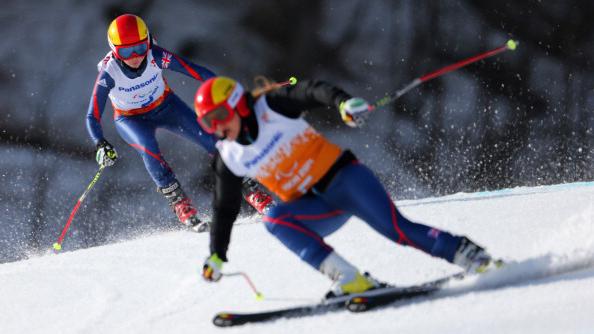Kelly Gallagher of Great Britain and guide Charlotte Evans in the Women’s Super-G for those visually impaired, during day three of the Sochi 2014 Paralympic Winter Games.
Meet two extraordinary athletes competing at the Paralympics in Sochi. They're skiers and they are inseparable on the slopes.
Great Britain's Kelly Gallagher is a 28-year-old, visually-impaired skier who won a gold medal in the super-G slalom event. She is from Northern Ireland and won gold with a time of 1:28.72 — just two-tenths of a second ahead of Russia's Aleksandra Frantseva at 1:28.94.
And she couldn't have done it without her guide skier, Charlotte Evans, who won a gold medal with her. Gallagher had poor eyesight from birth and was registered blind as a child. But she does have partial sight.
"I really don't see anything to do with the snow. All I see is Charlotte's orange bib that she wears. We start off side-by-side. She says '3-2-1 Go!' and then I chase her the whole way down the hill with bluetooth radio communications, so I don't really see anything but the orange bib."
"We're just about a ski's length separated from each other and the closer I can get, the better my skiing can be and the faster we can go down the hill together."
The Paralympic judges recognize the teamwork that's required for winning performances. Each athlete and guide get a medal and recognition.
Charlotte Evans says her role as guide skier is "to basically feedback everything that's happening, making sure that I tell her about the terrain changes, the combinations of the course, or what's happening under foot. And I have to relay that back before Kelly comes towards it."
Charlotte says it requires very fast response times. She has to look at least four gates ahead to make sure that she's getting enough information quick enough to be relayed to Gallagher.
"Basically it's alerting her as soon as anything happens. So say there's a roller coming, I'll be like 'Roller! then 'Standup!' and give technical feedback about how her skiing is going, whether she's got to stand on her outside foot, whether she's got to drive her outside hand forward, anything like that I have to pass back quickly."
It doesn't always go perfectly. The day after their gold medal performance on the super-G, Gallagher says something went wrong.
"I just kind of hit a gate, just the ski tip, it basically knocked me out of my rhythm and I was out of the course, and there's really nothing you can do. We were doing really well up to that point and then we were out, so it's just something that happens, I guess, in slalom."
Gallagher tried skiing for the first time at 17, but coming from Northern Ireland, she admits she wasn't a natural.
"Anybody from Great Britain or Northern Ireland or Ireland doesn't really have the opportunity to get on snow, it's not on your doorstep," Gallagher says. "But I guess it’s just a testament to the amount of work and effort that we've put in."
Gallagher and Evans teamed up for the first time four years ago.
"I struck gold with Charlotte in 2010," Gallagher says. "Charlotte had injured her ACL and was recovering from that and doing some coaching, and she took the opportunity to come and try and guide for me. Six weeks later, we were racing at world championships."
So what does it take to beat the tough international competition on the Rosa Khutor slopes in Sochi?
"There are really amazing athletes we're competing against," Gallagher says. "But mostly, we're competing against ourselves. You're trying to improve on every run and trying to put 100 percent of your effort in to see what the results are at the bottom of the hill."
I asked Evans what advice or encouragement she had for other people with impaired vision who might be interested in skiing. "Just get involved and try it! If you're brave and you have guts, then you're perfect for this sport," she says.
"Being a bit of an adrenalin junkie is good. It’s such a nice sport to be a part of and everyone really cares about each other, especially in our category, we're all such great friends."
Our coverage reaches millions each week, but only a small fraction of listeners contribute to sustain our program. We still need 224 more people to donate $100 or $10/monthly to unlock our $67,000 match. Will you help us get there today?
